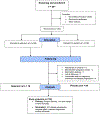Effects of selenium supplementation on pregnancy outcomes and disease progression in HIV-infected pregnant women in Lagos: A randomized controlled trial - PubMed (original) (raw)
Randomized Controlled Trial
. 2021 Jun;153(3):533-541.
doi: 10.1002/ijgo.13514. Epub 2021 Jan 5.
Olusola F Olowoselu 3, Sarah John-Olabode 3, Basirat O Hassan 4, Oluwatosin J Akinsola 5, Chidinma M Nwogu 2, Aloy O Ugwu 2, Olusanjo E Moses 6, Kabiru A Rabiu 6, Adegbenga Ajepe 2, Muisi A Adenekan 2, Adebola A Adejimi 5, Sulaimon A Akanmu 3, Phyllis J Kanki 7
Affiliations
- PMID: 33275775
- PMCID: PMC8122028
- DOI: 10.1002/ijgo.13514
Randomized Controlled Trial
Effects of selenium supplementation on pregnancy outcomes and disease progression in HIV-infected pregnant women in Lagos: A randomized controlled trial
Kehinde S Okunade et al. Int J Gynaecol Obstet. 2021 Jun.
Abstract
Objective: To examine the effects of selenium supplementation on pregnancy outcomes and disease progression among HIV-infected pregnant women in Lagos.
Methods: A randomized, placebo-controlled trial conducted among HIV-positive pregnant women between September 2018 and August 2019. At enrollment, 90 women were randomly assigned into each treatment arm to receive either a daily tablet of 200 μg elemental selenium or a placebo. Relevant participants' sociodemographic and clinical data were collected at enrollment and delivery.
Results: Women in the selenium arm had a significantly lower risk of preterm delivery (relative risk [RR] 0.32, 95% confidence interval [CI] 0.11-0.96) and a non-significant reduction in the risk of delivering term neonates with a low delivery weight (RR 0.24, 95% CI 0.05-1.19). Supplemental selenium does not increase the risk of perinatal death and adverse drug events.
Conclusion: The study reported a beneficial effect of prenatal selenium supplements on the risk of preterm delivery with no further reduction in risk among HIV-infected women who used the supplements for more than 14 weeks.
Trial registration: Pan African Clinical Trial Registry (PACTR201809756724274).
Keywords: CD4+ cell count; Lagos; Lagos University Teaching Hospital; low birth weight; preterm delivery; selenium; viral load.
© 2020 International Federation of Gynecology and Obstetrics.
Conflict of interest statement
CONFLIC TS OF INTEREST
The authors have no conflicts of interest.
Figures
FIGURE 1
Flowchart showing selection of the study population.
Similar articles
- Effects of selenium supplementation on pregnancy outcome and disease progression in HIV-infected pregnant women in Lagos, Nigeria: Study protocol for a randomised, double-blind, placebo-controlled trial.
Okunade KS, John-Olabode S, Akinsola OJ, Akinajo O, Akanmu SA, Kanki PJ. Okunade KS, et al. Medicine (Baltimore). 2019 Jan;98(3):e12735. doi: 10.1097/MD.0000000000012735. Medicine (Baltimore). 2019. PMID: 30653086 Free PMC article. Clinical Trial. - Selenium deficiency and pregnancy outcome in pregnant women with HIV in Lagos, Nigeria.
Okunade KS, Olowoselu OF, Osanyin GE, John-Olabode S, Akanmu SA, Anorlu RI. Okunade KS, et al. Int J Gynaecol Obstet. 2018 Aug;142(2):207-213. doi: 10.1002/ijgo.12508. Epub 2018 Apr 23. Int J Gynaecol Obstet. 2018. PMID: 29660833 Free PMC article. - Randomised trial of effects of vitamin supplements on pregnancy outcomes and T cell counts in HIV-1-infected women in Tanzania.
Fawzi WW, Msamanga GI, Spiegelman D, Urassa EJ, McGrath N, Mwakagile D, Antelman G, Mbise R, Herrera G, Kapiga S, Willett W, Hunter DJ. Fawzi WW, et al. Lancet. 1998 May 16;351(9114):1477-82. doi: 10.1016/s0140-6736(98)04197-x. Lancet. 1998. PMID: 9605804 Clinical Trial. - Micronutrient supplementation in adults with HIV infection.
Visser ME, Durao S, Sinclair D, Irlam JH, Siegfried N. Visser ME, et al. Cochrane Database Syst Rev. 2017 May 18;5(5):CD003650. doi: 10.1002/14651858.CD003650.pub4. Cochrane Database Syst Rev. 2017. PMID: 28518221 Free PMC article. Review. - Antiretroviral therapy (ART) for treating HIV infection in ART-eligible pregnant women.
Sturt AS, Dokubo EK, Sint TT. Sturt AS, et al. Cochrane Database Syst Rev. 2010 Mar 17;(3):CD008440. doi: 10.1002/14651858.CD008440. Cochrane Database Syst Rev. 2010. PMID: 20238370 Review.
Cited by
- Prevalence and determinants of moderate-to-severe anaemia in the third trimester of pregnancy: a multicenter cross-sectional study in Lagos, Nigeria.
Okunade KS, Olowoselu FO, Oyedeji OA, Oshodi YA, Ugwu AO, Olumodeji AM, Adejimi AA, Adenekan MA, Ojo T, Ademuyiwa IY, Adaramoye V, Okoro AC, Olowe A, Adelabu H, Akinmola OO, Yusuf-Awesu S, Oluwole AA. Okunade KS, et al. Sci Rep. 2024 May 18;14(1):11411. doi: 10.1038/s41598-024-61487-4. Sci Rep. 2024. PMID: 38762586 Free PMC article. - New medicines for spontaneous preterm birth prevention and preterm labour management: landscape analysis of the medicine development pipeline.
McDougall ARA, Hastie R, Goldstein M, Tuttle A, Ammerdorffer A, Gülmezoglu AM, Vogel JP. McDougall ARA, et al. BMC Pregnancy Childbirth. 2023 Jul 18;23(1):525. doi: 10.1186/s12884-023-05842-9. BMC Pregnancy Childbirth. 2023. PMID: 37464260 Free PMC article. - Selenium status in adults and children in Lusaka, Zambia.
Zyambo K, Hodges P, Chandwe K, Chisenga CC, Mayimbo S, Amadi B, Kelly P, Kayamba V. Zyambo K, et al. Heliyon. 2022 Jun 24;8(6):e09782. doi: 10.1016/j.heliyon.2022.e09782. eCollection 2022 Jun. Heliyon. 2022. PMID: 35800716 Free PMC article. - Selenium Supplementation in Pregnancy-Maternal and Newborn Outcomes.
Biswas K, McLay J, Campbell FM. Biswas K, et al. J Nutr Metab. 2022 May 4;2022:4715965. doi: 10.1155/2022/4715965. eCollection 2022. J Nutr Metab. 2022. PMID: 35571749 Free PMC article. - The Role of Selenium in Pathologies: An Updated Review.
Barchielli G, Capperucci A, Tanini D. Barchielli G, et al. Antioxidants (Basel). 2022 Jan 27;11(2):251. doi: 10.3390/antiox11020251. Antioxidants (Basel). 2022. PMID: 35204134 Free PMC article. Review.
References
- Bailey RL, West KP Jr, Black RE. The epidemiology of global micronutrient deficiencies. Ann Nutr Metab. 2015;66(suppl 2):22–33. - PubMed
- Mehta S, Fawzi WW. Micronutrient supplementation as adjunct treatment for HIV-infected patients. Clin Infect Dis. 2010;50(12):1661–1663. - PubMed
- Rayman MP. The importance of selenium to human health. Lancet. 2000;356(9225):233–241. - PubMed
- Schweizer U, Fradejas-Villar N. Why 21? The significance of seleno-proteins for human health revealed by inborn errors of metabolism. FASEB J. 2016;30(11):3669–3681. - PubMed
Publication types
MeSH terms
Substances
LinkOut - more resources
Full Text Sources
Other Literature Sources
Medical
Research Materials
